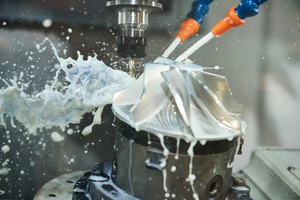

|
Edward Lowton
Editor |


|
| Home> | Production Engineering | >Lubrication | >Keep It Flowing: The Role of Metalworking Fluids in Maintenance Efficiency |
| Home> | Handbooks | >Maintenance Management Guide | >Keep It Flowing: The Role of Metalworking Fluids in Maintenance Efficiency |
Keep It Flowing: The Role of Metalworking Fluids in Maintenance Efficiency
04 September 2025
PROPER FLUID management is vital to productivity, precision and machine longevity, explains David Wright is Director-General of the United Kingdom Lubricants Association

Metalworking Fluids, covering water-mix, water-soluble and neat oils, are essential in the cutting, shaping, forming and rolling of metals such as steel, iron and aluminium. These fluids play a crucial role across general engineering processes, where consistent performance and reliability are essential.
Without metalworking fluids, CNC machines and other production equipment would run hotter, cutting tools would wear out faster, and operations would be more prone to breakdowns. Effective application and management of fluids help ensure efficient machining and long-term equipment health.
Five Essential Function
Metalworking fluids serve five core purposes, each of which contributes to performance and maintenance outcomes:
-
Cooling - Metal cutting generates significant heat through friction. Fluids help to cool the cutting edge or tool head by dispersing this heat across a broader area. This reduces thermal stress on tools and machines, cutting the risk of component failure.
-
Debris Removal - Precision machining generates swarf and metal fines. These can interfere with the cutting edge, especially in close-tolerance work. Fluids flush this debris away, keeping the interface clear and enabling accurate machining.
-
Cleaning - Water-mix fluids also clean the working surface during operation, preventing the build-up of material that could impact tool performance or the quality of the finished component.
-
Lubrication - Fluids create a thin lubricating film between the tool and the workpiece, reducing direct metal-to-metal contact. This lowers friction and wear, prolonging tool life and reducing the need for frequent replacement or servicing.
-
Operational Efficiency - By keeping tools cooler, cleaner and better lubricated, metalworking fluids improve overall efficiency, helping to maintain production rates and reduce unplanned downtime due to breakdowns or tool failure.
Maintenance and Monitoring
Maintenance teams should always follow the CNC machine manufacturer’s service schedule, but the condition of metalworking fluid itself should not be overlooked. Fluid degradation, contamination or improper mixing can lead to corrosion, reduced tool life and even machine damage.
Working With the Right Supplier
Choose your fluid supplier with care. The right partner can advise on fluid selection based on materials, machining process, ambient conditions and humidity. Many suppliers now offer total fluid management services, regular site visits to test and maintain fluid quality, check for bacterial contamination, and apply biocides where necessary.
Ongoing Support for Long-Term Gains
A long-term partnership with your fluid supplier ensures you're not just buying a product, but gaining expert support to optimise your machining operations. It’s a key step in reducing reactive maintenance and improving overall plant efficiency. Always consult your fluid supplier for advice.
United Kingdom Lubricants Association
Tel: 01442 875922
Email: [email protected]
Web: www.ukla.org.uk


















